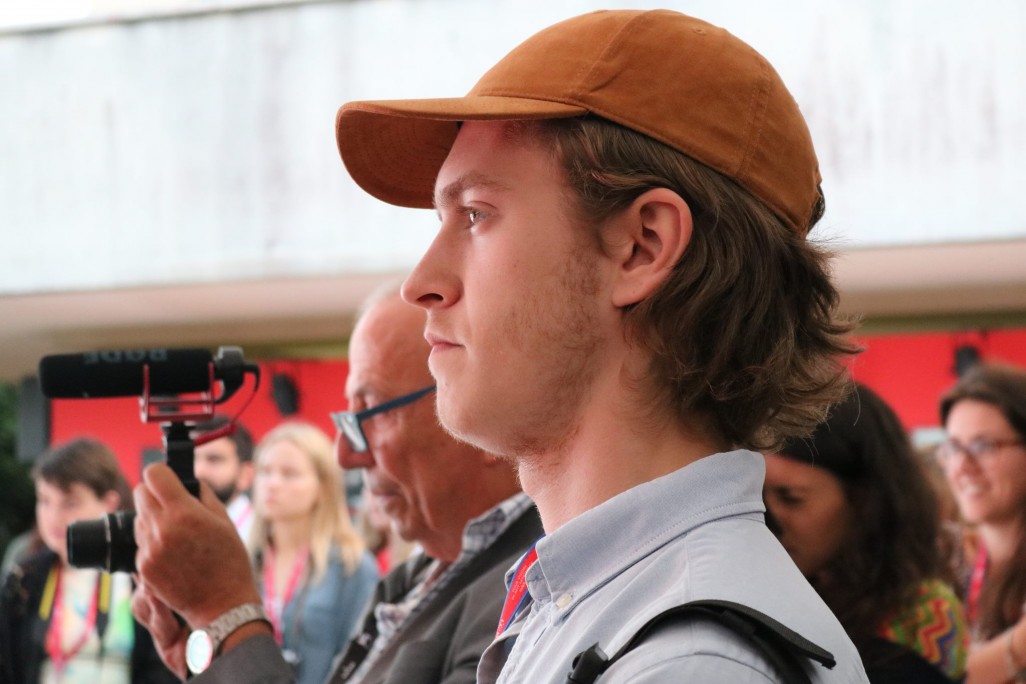This year Philippe is Bulgarian Ambassador in "28 Times Cinema" - Giornate degli Autori's Jury, in the composition of which participated Europa Cinemas, European parliament and LUX Prize. This is his first engagement in a prestigious international film forum of such scale and influence.
The Venice Film Festival is a peculiar phenomenon – it is both crowded and calm; glamorous and humble; prestigious and accessible. The “insiders’” experience and that of the “regular” audience members, who can freely attend the vast majority of the screenings and talks, coincide to a large extent. This makes for a surprisingly peaceful and collective day-to-day festival experience, which doesn’t seem to be the case of most other major festivals.
This year, on behalf of “Dom na kinoto” and the Sofia International Film Festival, I had the privilege to be one of the 28 jury members of the Giornate degli Autori section at the 74th Mostra Internazionale d’Arte Cinematografica. Aside from my Giornate-related tasks, I am now also engaged as the Bulgarian ambassador of the European Parliament’s film prize – the LUX Prize – for the coming months.
Firstly, let’s go through a number of this year’s titles which – for better or for worse – are not to be missed:
MOTHER! (Darren Aronofsky, 2017)
Over time, Aronofsky has earned his reputation as an extremist within mainstream cinema. Regardless, he has never spewed a film as spontaneous, radical and subversive as his latest. Following the mental activity of a woman who loses all touch with reality in her own home, in no time does this seemingly simplistic story turn into one of the most nightmarish, surrealistic and merciless audiovisual experiences in a while.
ANGELS WEAR WHITE (Vivian Qu, 2017)
The only female filmmaker in competition at this year's Venice Film Festival delivers a devastating and harrowingly perceptive study of rape culture and corruption in contemporary China. What seemed to be a sure-fire contender for the Golden Lion was surprisingly disregarded by this year’s official jury – it nonetheless deserves the audience’s full attention and esteem.
THE SHAPE OF WATER (Guillermo del Toro, 2017)
“I believe in life, I believe in love, and I believe in cinema,” exclaimed del Toro as he (somewhat unexpectedly) accepted this year’s Golden Lion. The Mexican mastermind’s latest phantasmagoria has visibly soaked up large quantities of this faith: it is not only a hypnotic, boundless romantic poem, but also a genuine ode to the history of cinema and music.
MEKTOUB, MY LOVE: CANTO UNO (Abdellatif Kechiche, 2017)
The 2013 Palme d’Or-winning director returns with another overly ambitious - and overly talkative - look at the unreconciled sexual tension within a group of young people in the South of France. Impressive dialogue and performances make for a vivid and dynamic story, and the incessant erotic teasing is sure to repeatedly engage, frustrate, or even infuriate the audience.
***
By general consensus, here are some notable titles which I unfortunately did not manage to see: FOXTROT (Samuel Maoz); CUSTODY (Xavier Legrand); CANIBA (Verena Paravel and Lucien Castaing-Taylor)
As for the LUX Prize finalists, which will soon be shown in Sofia and other selected Bulgarian cities:
WESTERN (Valeska Grisebach, 2017)
A gritty - yet subtly nuanced - tale of respect, belonging, and the importance of communication, Grisebach's latest is one of this year's finest directing specimens. On a local level, the German filmmaker's use of the specificities of the Bulgarian language, behaviour and lifestyle is nothing short of impressive.
SAMI BLOOD (Amanda Kernell, 2016)
Kernell’s delicate and minimalistic debut shines a light on the little-known fate of the Sami – an indigenous Finno-Ugric people – and their complex relationship with the modern Swedish society of the 1930s.
BPM (Robin Campillo, 2017)
Not only does Campillo tell the staggering and enlightening story of Parisian HIV/AIDS activists Act-Up during the 1990s – he also crafts one of the most painfully sincere love stories this year. At no point does the film’s didactic discourse lose rightfulness and relevance, and at no point does its romance lack vibrancy and magnetism.









